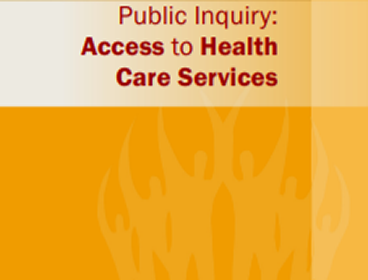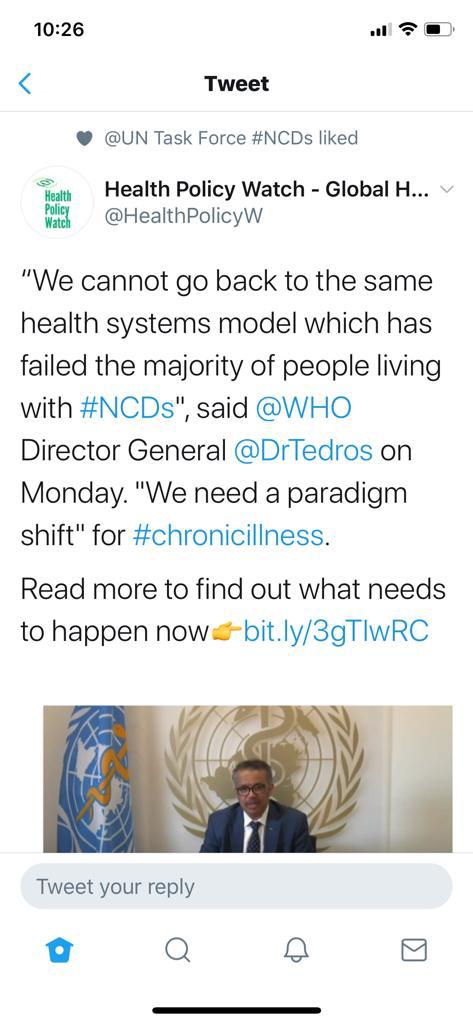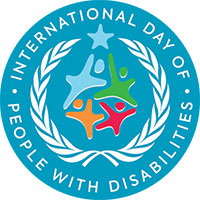

The Memorial Lecture Series celebrates the memory of a person who worked tirelessly towards, and achieved so much, in realising the goals of human rights and democracy. The Dullah Omar Institute and the Faculty of Law honour the late Dullah Omar with a lecture on human rights and democracy in his name. As a fighter for human rights and democracy, he leaves behind a rich legacy on which we draw inspiration and guidance.

Early in the COVID-19 pandemic WHO’s @DrTedr os highlighted the problems of access to health services by millions of people living with NCDs+ in his tweet. His tweet certainly mirrors what the SA NCDs Alliance and our allies have been saying since 2007 when the SA Human Rights Commission (SAHRC) held its first public hearings into the right access to health services.
os highlighted the problems of access to health services by millions of people living with NCDs+ in his tweet. His tweet certainly mirrors what the SA NCDs Alliance and our allies have been saying since 2007 when the SA Human Rights Commission (SAHRC) held its first public hearings into the right access to health services.
COVID-19 changed the parameters of vulnerability to include NCDs+, mental health, and reemphasised disability in all its shapes and forms.
SAHRC report 2007
15 years ago the primary focus was understandably on access to HIV/AIDS and TB services. It was the height of the communicable disease epidemic. And amidst our homegrown “AIDS-denialism”. It was also the midpoint of the Millenium Development Goals (MDGs) where vast amounts of funding were channelled into communicable diseases and maternal-child services. That pattern of expenditure and funding remains in place today.
Executive summary
The report’s executive summary is salutary: it fits today’s health service access issues in the COVID-19 pandemic. Just substitute NCDs+ for communicable diseases. And, we have a similar complaint today.
The report’s opening quote is ironically, but not surprisingly, from The AIDS Law Project, the early version of Section 27:
“We don’t yet have a definition of essential health services. This means we don’t have a base line for the right to health and it is impossible to cost the health service and thereby determine objectively what can be
afforded.”
We still don’t have the definition. But HIV unlike NCDs+ is a National Development Plan priority. As for the rest of the conclusions, they mostly are unmet PLWNCDs+ The main change to health services is that HIV/TB services dominate primary health care. We beg for evidence-based inclusion of NCDs + throughout the life-course. And, more not just a tack on to HIV, TB and STI services.
That is why we fight on. Read the SAHRC 2007 report on access to health services SAHRC 2007Health Report
After years of
During December talks between the SANCDA and SAHRC continued about inequity for NCDs and disabilities. On 18th December 2020 culminated with two major activities occurred: a meeting between with the SAHRC and the laying of a formal complaint on behalf of PLWNCDs.
On December 18 the SANCDA met with the SA Human Rights Commission to lodge a complaint about the state of NCDs+ and disability policy in South Africa.
“We cannot rest if even a single one of our citizens is a victim of discrimination and prejudice on account of having a disability.” This is the message from President Cyril Ramaphosa on International Day of Persons with Disabilities.
Delivering his message on Thursday, President Ramaphosa warned that there can be no sustainable growth and development in any society if there are members who are excluded from being active citizens on account of disability.
The President said the COVID-19 pandemic has exposed the difficulties people with disabilities face in a number of sectors – from accessing healthcare to using public transportation and seeking employment.
“In line with our commitment to building towards an inclusive, accessible and sustainable post COVID-19 world, we must ensure that persons with disabilities are not left behind.
“The social, economic and political inclusion of persons with disabilities is included in the UN Agenda 2030 and Sustainable Development Goals (SDGs), as well as our own National Development Plan (NDP). Now that we are in the final decade of implementation of both the NDP and Agenda 2030, we must increase the pace of change,” President Ramaphosa said.
Presidential Working Group on Disability
The President said through the work of the Presidential Working Group on Disability, government is making sure disability is mainstreamed in all government plans and programmes, along with the necessary budgets.
“Disability has been included in the work streams of the National Coronavirus Command Council. We are striving to ensure that the legal, social, economic, health care and containment work streams include disability in their work.
“A process is underway to finalise a report on the impact of the Coronavirus pandemic on persons with disabilities, which will guide not only our approach to disability in the economic recovery plan, but also our preparation for future crises of this nature,” he said.
As government works to implement the Economic Reconstruction and Recovery Plan, it is making sure that people with disabilities are prioritised when it comes to job opportunities under the Presidential Employment Stimulus, and that businesses owned and managed by people with disabilities have access to opportunities in the key growth sectors.
End gender-based violence against disabled people
As South Africa marks 16 Days of Activism for No Violence against Women and Children, President Ramaphosa challenged every citizen to work to end gender-based violence (GBV) against persons with disabilities, and ensure that survivors get the necessary support.
“According to numerous studies, women with disabilities are more likely to suffer abuse at the hands of partners. Women and children with cognitive disabilities may be taken advantage of due to their perceived inability to report the crime,” the President said.
Disability Rights Awareness Month 2020
The International Day for Persons with Disabilities is observed annually on 3 December to promote the full and equal participation of persons with disabilities in society and the economy, and to take action for the inclusion of persons with disabilities in all aspects of society and development.
The United Nations has themed this year’s commemoration ‘Building Back Better: toward a disability-inclusive, accessible and sustainable post COVID-19 World”.
The International Day for Persons with Disabilities also brings to a close government’s Disability Rights Awareness Month 2020 (DRAM 2020).
The DRAM, which run from 3 November to3 December 2020, aims to raise awareness to the harmful effects stigmatisation, prejudice and stereotypes have on the disability sector. The campaign also aims to celebrate individuals who have overcome prejudice, societal barriers, and hardship to excel in their chosen fields.

“We cannot rest if even a single one of our citizens is a victim of discrimination and prejudice on account of having a disability.” This is the message from President Cyril Ramaphosa on International Day of Persons with Disabilities.
Delivering his message on Thursday, President Ramaphosa warned that there can be no sustainable growth and development in any society if there are members who are excluded from being active citizens on account of disability.
The President said the COVID-19 pandemic has exposed the difficulties people with disabilities face in a number of sectors – from accessing healthcare to using public transportation and seeking employment.
“In line with our commitment to building towards an inclusive, accessible and sustainable post COVID-19 world, we must ensure that persons with disabilities are not left behind.
“The social, economic and political inclusion of persons with disabilities is included in the UN Agenda 2030 and Sustainable Development Goals (SDGs), as well as our own National Development Plan (NDP). Now that we are in the final decade of implementation of both the NDP and Agenda 2030, we must increase the pace of change,” President Ramaphosa said.
Presidential Working Group on Disability
The President said through the work of the Presidential Working Group on Disability, government is making sure disability is mainstreamed in all government plans and programmes, along with the necessary budgets.
“Disability has been included in the work streams of the National Coronavirus Command Council. We are striving to ensure that the legal, social, economic, health care and containment work streams include disability in their work.
“A process is underway to finalise a report on the impact of the Coronavirus pandemic on persons with disabilities, which will guide not only our approach to disability in the economic recovery plan, but also our preparation for future crises of this nature,” he said.
As government works to implement the Economic Reconstruction and Recovery Plan, it is making sure that people with disabilities are prioritised when it comes to job opportunities under the Presidential Employment Stimulus, and that businesses owned and managed by people with disabilities have access to opportunities in the key growth sectors.
End gender-based violence against disabled people
As South Africa marks 16 Days of Activism for No Violence against Women and Children, President Ramaphosa challenged every citizen to work to end gender-based violence (GBV) against persons with disabilities, and ensure that survivors get the necessary support.
“According to numerous studies, women with disabilities are more likely to suffer abuse at the hands of partners. Women and children with cognitive disabilities may be taken advantage of due to their perceived inability to report the crime,” the President said.
Disability Rights Awareness Month 2020
The International Day for Persons with Disabilities is observed annually on 3 December to promote the full and equal participation of persons with disabilities in society and the economy, and to take action for the inclusion of persons with disabilities in all aspects of society and development.
The United Nations has themed this year’s commemoration ‘Building Back Better: toward a disability-inclusive, accessible and sustainable post COVID-19 World”.
The International Day for Persons with Disabilities also brings to a close government’s Disability Rights Awareness Month 2020 (DRAM 2020).
The DRAM, which run from 3 November to3 December 2020, aims to raise awareness to the harmful effects stigmatisation, prejudice and stereotypes have on the disability sector. The campaign also aims to celebrate individuals who have overcome prejudice, societal barriers, and hardship to excel in their chosen fields.





